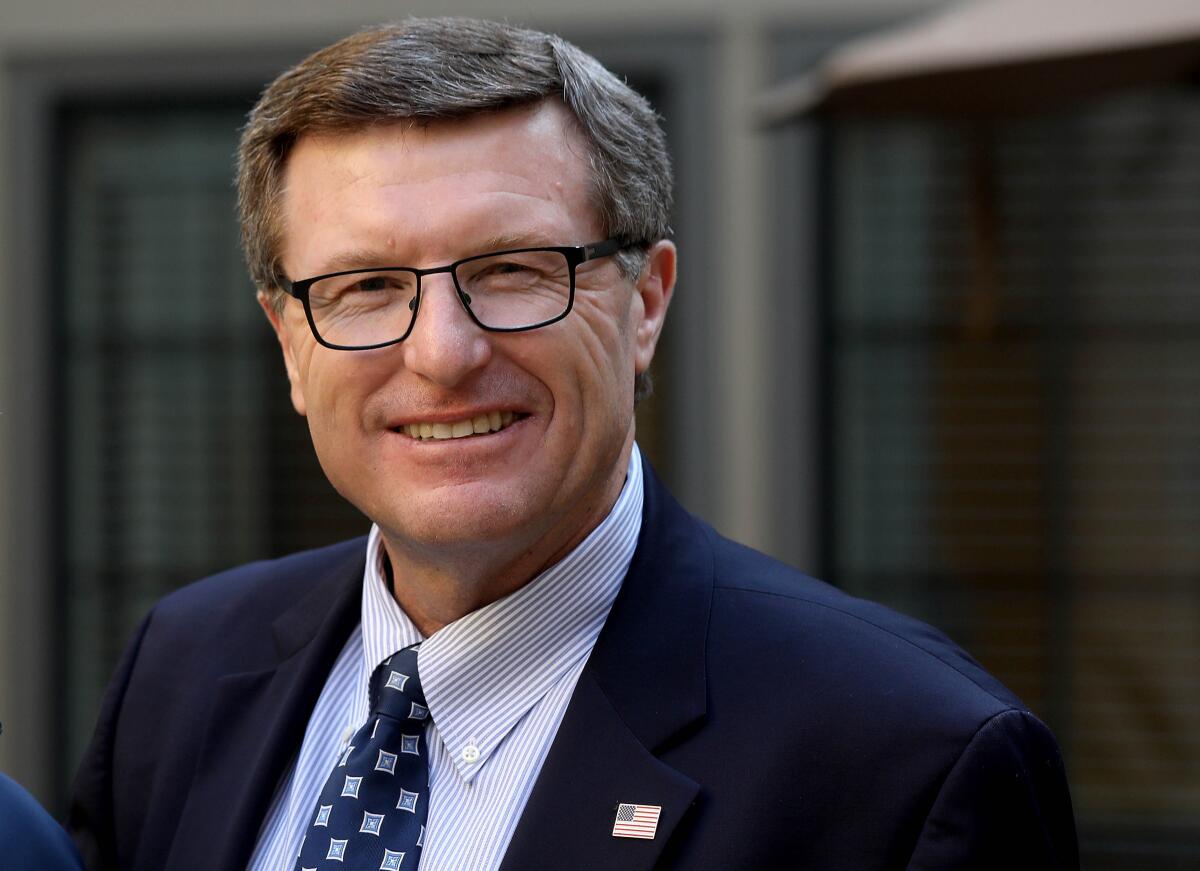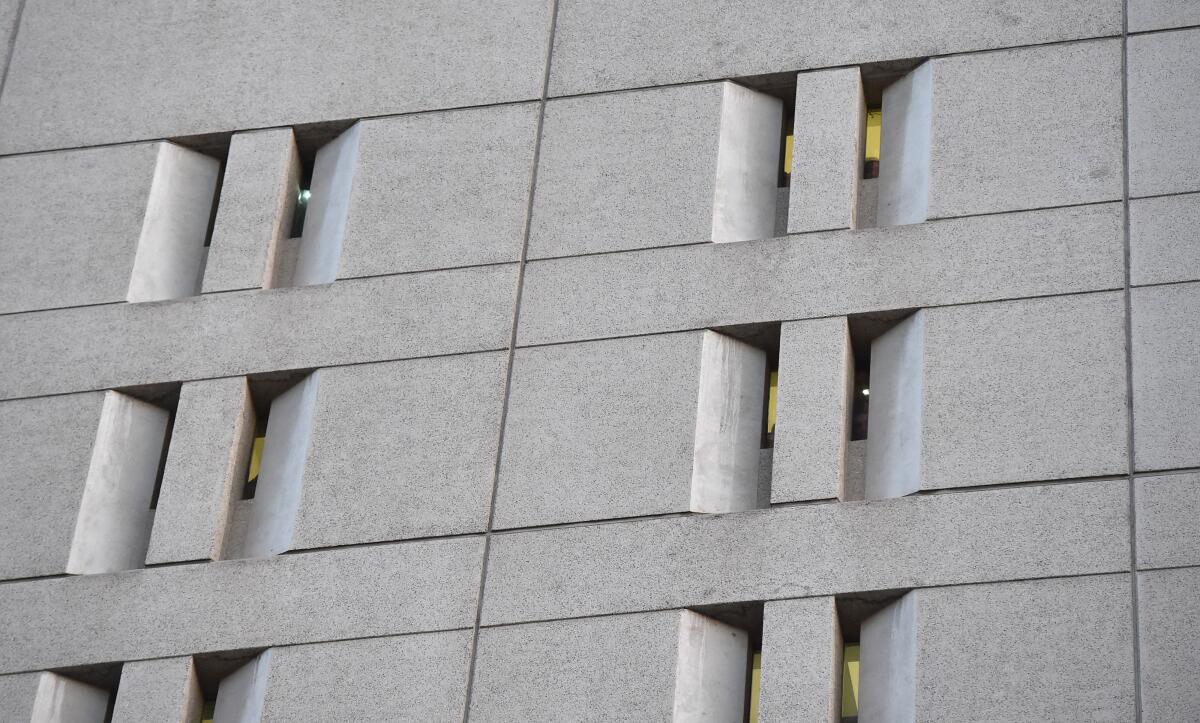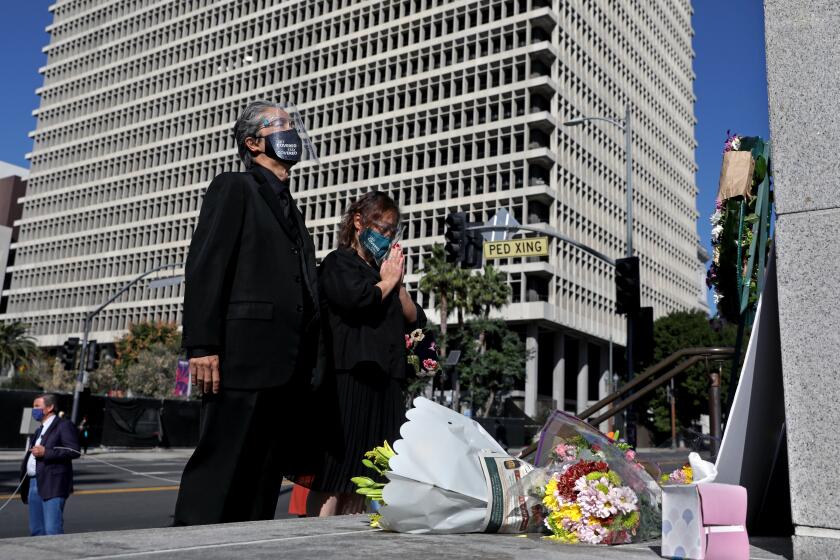Coronavirus shutdown of jury trials upends California’s federal courts

- Share via
Ronald Ware spent five months in a Santa Ana jail awaiting trial after his arrest in Brea last summer on a federal gun charge.
His day in court never came. U.S. District Judge Cormac J. Carney dismissed the case in January, saying emergency rules that shut down federal jury trials during the pandemic had denied Ware his right to a speedy trial.
“Nowhere in the Constitution is there an exception for times of emergency or crisis,” Carney wrote in the ruling that set Ware free.
Carney has tossed criminal charges against a jewelry-store robbery suspect and three others for the same reason. The decision to shut down all jury trials, he found, was excessive.
The 13-month suspension of trials in the federal court system’s Central District of California, which includes Los Angeles and six neighboring counties, has disrupted the prosecution of hundreds of alleged drug dealers, tax cheats, cybercriminals, child porn purveyors and health insurance swindlers. It has clogged the courts with an unprecedented backlog of both criminal and civil cases.
While many of those charged with crimes have been free on bail as they await trial, others have remained behind bars, enduring long stretches of solitude as detainees are kept apart to minimize spread of the coronavirus.
Guan Lei, a Chinese scholar in the U.S. for research at UCLA, has been detained for eight months on a charge of destroying a hard drive in an attempt to obstruct a federal investigation.
After two postponements, Guan’s scheduled May 4 trial will have to be delayed again, because Los Angeles federal court will not yet be open. Guan appeared at a court hearing Thursday by video from a downtown L.A. jail.
“Mr. Guan, I’m very sorry it’s taken this long to give you a trial,” U.S. District Judge Michael W. Fitzgerald told him.
Case dismissals have been rare; prosecutors have appealed Carney’s decisions. But an increasing number of defendants are alleging violations of their speedy trial rights, casting uncertainty over their cases as the pandemic subsides and federal courts prepare to reopen.
Criminal defendants have the right to a trial within a set time period. In federal court, if they invoke that right, their trial generally must start within 70 days of when charges were filed. Typically, judges grant requests for more time to prepare for trial.

One of the next defendants to seek dismissal of charges on speedy trial grounds in federal court will be Jerome Terry, who has been jailed for three years awaiting trial. He was arrested in connection with his alleged role in a sex-trafficking conspiracy in which two aspiring Canadian models were forced to work as prostitutes in the Hollywood Hills.
Terry’s trial was most recently put off until July. “There’s this general feeling of purgatory,” said Meghan Blanco, his attorney.
With nearly 20 million residents, California’s Central District is the country’s most populous federal judicial district, spanning Los Angeles, Orange, Riverside, San Bernardino, Ventura, Santa Barbara and San Luis Obispo counties.
Even before the pandemic, vacancies on the bench had left overworked judges struggling to keep up with growing caseloads. When jury trials stopped in March 2020, 10 of the district’s 28 judicial slots were unfilled. Six vacancies remain for President Biden to fill.
In the year before the trial shutdown, more than 16,000 new cases were filed in the district: 15,514 civil lawsuits and 1,138 criminal prosecutions.
Most criminal cases yield guilty pleas, and most civil lawsuits end in settlements. But nearly 150 trials typically occur each year in the district’s three courthouses — in Los Angeles, Santa Ana and Riverside.
Pretrial hearings have kept moving over the last 13 months, thanks largely to Zoom. But the strongest incentive for guilty pleas and civil settlements often comes on the eve of a trial, so many cases that might have ended in normal times have instead lumbered along.
“Once you open up the courthouse to trials, I think that, in and of itself, helps alleviate the backlog,” said U.S. District Judge Philip S. Gutierrez, the chief judge of the Central District. “There’s always going to be that 150 cases that you’re going to have to try, and those are backed up. So I think in the short term, we’re going to be working really hard and trying more cases than we would otherwise try once we get up to speed.”
Criminal trials will have top priority, he said, starting with defendants in custody. With the recent decline in California’s coronavirus infections, jury summonses have been issued for federal trials to resume May 10 in Orange County. Gutierrez expects trials in Los Angeles and Riverside to start back up in June.
Safety measures will be extensive. Jury selection will be tightly choreographed so it takes place in large courtrooms where everyone can stay six feet apart. Elevator use will be curtailed. Plexiglass will section off each judge, witness and court reporter. Masks will be mandatory, with possible exceptions for witnesses.
In many other jurisdictions, trials have moved forward during the pandemic. Most visible is the ongoing murder trial in state court of former Minneapolis Police Officer Derek Chauvin in the death of George Floyd at a time when the coronavirus is far more widespread in Minnesota than in California.
State courts in California have also pressed ahead with trials. In January and February, four employees of the Los Angeles County Superior Court system died from COVID-19; it’s unclear whether they caught the coronavirus in court.
The Los Angeles County Superior Court system is still holding in-person hearings despite the recent deaths of three court employees from COVID-19.
When Carney, a judge in Santa Ana federal court, dismissed the five criminal cases, he said he was troubled that trials were taking place safely right across the street in Orange County Superior Court and that federal grand juries were still meeting.
A panel of the U.S. 9th Circuit Court of Appeals heard arguments last month on Carney’s dismissal of a 35-count indictment against Jeffrey Olsen, a Newport Beach doctor. He was charged with prescribing oxycodone and other opiates to addicts and drug dealers with no medical need for them.
Carney found the court’s halt in trials had denied Olsen his right to a speedy trial. Just as he did in the four other cases he tossed, Carney dismissed the indictment with prejudice, meaning prosecutors could not refile charges after the pandemic.
The 9th Circuit panel questioned whether Carney had done a full legal analysis before dropping the case — and whether he’d fully considered virus safety concerns.
“Isn’t he trying to send a message to his colleagues?” Judge Morgan B. Christen asked, alluding to Carney’s open annoyance with Gutierrez and other Central District judges who overwhelmingly backed the shutdown of jury trials.
Assistant U.S. Atty. Charles E. Fowler Jr. told the panel that courts must strike a balance between a defendant’s right to a speedy trial and the people’s right to accountability for criminal conduct.
“I don’t think the court considered the miscarriage of justice factor at all,” Fowler said of Carney.
From the bench on Friday, Carney defended his dismissal of cases, saying that pressing ahead with the prosecutions would have violated defendants’ constitutional rights. Yet with the resumption of jury trials now imminent, Carney granted prosecutors’ request for a one-month delay in the trial of Darren McGhee, who was charged with cocaine distribution after six 1-kilogram bricks of the drug were allegedly found in his suitcase at Los Angeles International Airport.
At a hearing held over video, Carney told McGhee’s attorney, Elena Sadowsky, that he agreed with her that the trial could have gone forward this week, but said, “circumstances have changed.” McGhee’s trial will start May 10, he said, and it will be the Central District’s first since March 2020.
The judge reviewed safety precautions that he vowed to enforce. He said he’d bought some plexiglass “on my own nickel” to heighten protections around the witness box, where prosecutors and the defense lawyer will each stand to make opening and closing arguments.
The jury will spread out in the courtroom’s audience section, he said, and spectators will be allowed to watch only by livestream in a room nearby.
“I don’t want people breathing on one another,” he said. “I’m trying to keep the jury together as much as I can, and I don’t want the public disrupting their space or being too close to them.”
More to Read
Sign up for Essential California
The most important California stories and recommendations in your inbox every morning.
You may occasionally receive promotional content from the Los Angeles Times.













